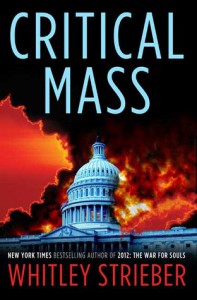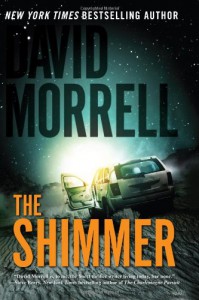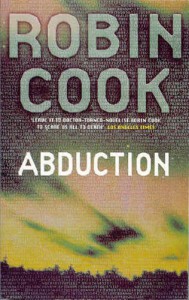Woken Furies (Takeshi Kovacs Novels)
 If I were a neuroscientist, I’d want to dissect Richard K. Morgan’s brain. The 25th century worlds he creates for his Takeshi Kovacs novels are so richly detailed and colored, his brain must certainly have extraordinary imaginary powers. This third Kovacs novel, Woken Furies, only strengthens that belief.
If I were a neuroscientist, I’d want to dissect Richard K. Morgan’s brain. The 25th century worlds he creates for his Takeshi Kovacs novels are so richly detailed and colored, his brain must certainly have extraordinary imaginary powers. This third Kovacs novel, Woken Furies, only strengthens that belief.Kovacs, a former UN Protectorate Envoy – more enforcer than diplomat – returns to his native planet, Harlan’s World, seeking revenge on the Knights of the New Revelation, a cult of misogynist religious zealots he holds responsible for the death of the only woman he ever loved. In the 25th century, death is relative. Consciousness has been digitalized and stored in memory “stacks” implanted in the base of everyone’s skull. As long as the stack survives, a person can be “re-sleeved” into a new body. If the stack is destroyed, however, death is permanent. The Knights Kovacs is pursuing made sure the woman he loved was permanently dead.
Following a raid on a New Revelation strong point, Kovacs escapes by joining up with a group of “deComs,” mercenaries who earn their keep by destroying intelligent robotic weapons left over from a civil war that made one of Harlan’s World’s continents uninhabitable. The group’s leader, Sylvie, is a “command head” whose brain has been enhanced with electronics to aid in fighting the robots. Soon it becomes apparent Sylvie’s command software has been invaded by another consciousness—that of the long dead revolutionary, Quellcrist Falconer, who begins to take over control of her body.
Kovacs finds himself unwillingly dragged into a neo-Quellcrist uprising, while at the same time being pursued by New Revelation assassins, a Yakuza warlord, and agents of the ruling oligarchy, the Harlan family. Among the latter is an Illegal download of a younger Kovacs consciousness who determined to kill his older self.
Morgan’s work is known for its acid social commentary, and Woken Furies is drenched in it—from the oligarchic ruling class to the hypocritical religious extremists. Morgan has said this would be the last Kovacs book. Perhaps so. But it won’t the last of Morgan’s work I read.
Critical Mass
 In Whitley Strieber’s Critical Mass, Las Vegas, Nevada is nuked by a new Islamic extremist group. Worse, the same group has planted nuclear devices in national capitals in the Americas, Europe, and Asia, holding them hostage in an attempt to bend the world to Sharia law. As American intelligence operative Jim Deutsh races the clock to find the bomb intended to destroy Washington, DC, he finds betrayal at each step by a national security organization corrupted with deep penetration by enemies of the United States.
In Whitley Strieber’s Critical Mass, Las Vegas, Nevada is nuked by a new Islamic extremist group. Worse, the same group has planted nuclear devices in national capitals in the Americas, Europe, and Asia, holding them hostage in an attempt to bend the world to Sharia law. As American intelligence operative Jim Deutsh races the clock to find the bomb intended to destroy Washington, DC, he finds betrayal at each step by a national security organization corrupted with deep penetration by enemies of the United States.Strieber wraps within this book’s pages a myriad of true dangers facing us all: the disappearance of tons of nuclear material from Russia; the collapse of the U.S. intelligence operation aimed at interdicting those lost nukes when the Bush administration outed CIA operative Valerie Palme; and the bureaucratic nightmare created by Bush’s reorganization of the intelligence community, making it slow to respond to emergent dangers, and crowded with potentially corrupted contractors.
The author avoids the pitfalls many writers of such thrillers have made, and avoids painting the Islamic religion with a brush of evil. Instead, he makes it clear extremism of any ilk, political or religious, is dangerous. In one scene, the bombing of Las Vegas – Sin City – is applauded by Christian fundamentalists. In another, the world – Christians, Jews, and Muslims – learns to pray together. Plus the only person Deutsh knows he can trust is his former wife, herself a Muslim.
Strieber’s minutely detailed narrative of the destruction caused by nuclear weapons is both horrifying and overwhelming. At times, I wanted to shout, “Stop!” But I think that was the author’s intention. Critical Mass is a definite page turner, but it is a thinking man’s page turner.
The Martian Chronicles (The Grand Master Editions)
 I read Ray Bradbury’s The Martian Chronicles back in high school, but after recently listening to radio dramatizations of several stories from Chronicles, I decided to read it again. I have to say, I appreciated it much more the second time around.
I read Ray Bradbury’s The Martian Chronicles back in high school, but after recently listening to radio dramatizations of several stories from Chronicles, I decided to read it again. I have to say, I appreciated it much more the second time around.In Chronicles, Bradbury leads the reader through an episodic history of Earth’s colonization of Mars, from the early expeditions that never returned to the destruction of mankind by nuclear war. In each of the stories, Bradbury uses wit, melodic narration, and biting sarcasm to expose the weaknesses and failures of mankind. This is not science fiction, but science fantasy at its best.
Interestingly, the stories in The Martian Chronicles were never intended to be part of a book. On a trip to visit New York publishers, Bradbury’s stories were turned down by a dozen different publishers. Over dinner, one editor named Walter Bradbury (no relation to the author) suggested Bradbury be tied together into a novel and even suggested the name. Bradbury – Ray, not Walter – loved the idea and his first novel was born. I, for one, am glad it was.
Altered Carbon: A Takeshi Kovacs Novel (Takeshi Kovacs Novels)
 Richard K. Morgan has successfully taken 20th century hard-boiled crime fiction, tossed in a little noir, and needle cast it into the 25th century.
Richard K. Morgan has successfully taken 20th century hard-boiled crime fiction, tossed in a little noir, and needle cast it into the 25th century.In Altered Carbon, Morgan creates a universe where the human race has spread itself among the stars, human attraction has been distilled down to a few basic chemicals, and death requires a new definition. Human consciousness is digitalized and downloaded into small cortical “stacks” implanted in the spine. As long as the stack exists, death is simply a minor bump in the long road of life living in different bodies or “sleeves.” Real death, or “R.D.,” only occurs if your stack is destroyed – and there are ways of getting around that if you have enough money.
Takeshi Kovacs is a former Envoy (basically a henchman) for the reigning government, called the United Nations Protectorate. Following his latest death, Kovacs is beamed via “needle casting” from his home world to Earth and sleeved into the body of a corrupt cop whose digital personality is serving time “on stack.” Kovacs was brought to Earth by Larens Bancroft, a 300-year-old billionaire, to investigate Bancroft’s last death, written off by the cops as a suicide. Bancroft, now resleeved in a cloned body, has no memory of the event, and believes he was actually murdered.
Morgan pulls off this unlikely plot by weaving a hard-boiled narrative with intricate sociological details. His wise-cracking hero, Kovacs, is hardened by his life of violence, yet remains sympathetic. Morgan’s eye for detail does for his version of the 25th century what J.R.R. Tolkien’s detailed eye did for the Wilderland. In doing so, he raises many philosophical questions about what constitutes a person’s life and death.
Predator Strike
 Osama bin Laden was not killed by a SEAL team in a Pakistani hide-out in 2011. He was captured 10 years before and secretly held prisoner by the United States until his death was convenient. Well, that’s a popular conspiracy theory, at least. In Predator Strike!, Australian writer Liam Saville wraps that conspiracy theory into a taut military mystery novella. Saville does not claim to believe the bin Laden theory, but he has succeeded in turning it into a plausible plot line.
Osama bin Laden was not killed by a SEAL team in a Pakistani hide-out in 2011. He was captured 10 years before and secretly held prisoner by the United States until his death was convenient. Well, that’s a popular conspiracy theory, at least. In Predator Strike!, Australian writer Liam Saville wraps that conspiracy theory into a taut military mystery novella. Saville does not claim to believe the bin Laden theory, but he has succeeded in turning it into a plausible plot line.Australian Defense Force Investigative Service officer, Captain Sam Ryan, is rushed to Afghanistan to investigate the apparent suicide of an Australian soldier who, only weeks earlier, had survived a blue-on-blue attack on his sniper team by an American Predator combat drone. Ryan leans that in the days leading up to his death, the young sniper claimed he and his partner had seen bin Laden in the custody of American soldiers in Afghanistan only days before he was reportedly killed in Pakistan. Ryan quickly finds himself targeted by unknown forces trying to thwart his investigation by bluff and violence.
An army officer turned police officer, Saville writes with a clean, thrifty grace. He doesn’t waste words, but brings the reader along with a clear and vivid narration. Sam Ryan is no Dirty Harry; he’s a realistic, professional investigator and military officer. He’s also someone you enjoy spending time with.
Saville’s depiction of the war in Afghanistan rings with authenticity, from his biting description of the overwhelming wealth of the American military compared to its poorer Aussie cousin, to his descriptions of combat action. But above all else, Predator Strike! Is an excellent example of a police procedural.
Predator Strike! Is the first of a planned series of mystery novellas. I, for one, am looking forward to reading about more of Captain Sam Ryan’s cases.
Maltese Falcon (Read a Great Movie)
 Everyone, I think, knows this story. The Humphrey Bogart movie made from this book is a cinematic classic. So, too, is this book. In fact, the movie was very true to the book, right down to the dialogue.
Everyone, I think, knows this story. The Humphrey Bogart movie made from this book is a cinematic classic. So, too, is this book. In fact, the movie was very true to the book, right down to the dialogue.A former private detective himself, Hammett's writing style is precise and without waste, as if he were simply writing a case report. This so different from Raymond Chandler's colorful, wise-cracking style. But for Hammett's Sam Spade, it works.
Echo (Alex Benedict)
 This was my first exposure to both Jack McDevitt and his Alex Benedict series. I found this a very enjoyable read. Take away the sci-fi aspect, and the book is a damn fine mystery novel. I'm looking forward to trying more of McDevitt's works.
This was my first exposure to both Jack McDevitt and his Alex Benedict series. I found this a very enjoyable read. Take away the sci-fi aspect, and the book is a damn fine mystery novel. I'm looking forward to trying more of McDevitt's works.
The Shimmer
 Take a mysterious natural phenomenon like the Marfa Lights, a famous movie classic like "Giant," toss in a sinister military weapons project, mix well with a heart-wrenching love story, and what do you get? David Morrell's "The Shimmer," a fast-paced, page-turning sci-fi thriller.
Take a mysterious natural phenomenon like the Marfa Lights, a famous movie classic like "Giant," toss in a sinister military weapons project, mix well with a heart-wrenching love story, and what do you get? David Morrell's "The Shimmer," a fast-paced, page-turning sci-fi thriller."Shimmer" takes place in Rostov, Texas, Morrell's fictional stand-in for Marfa, Texas, where strange lights can sometimes be seen dancing in the darkness across the rough lands near the Mexican border. The book's hero, a Santa Fe police officer Dan Paige, chases his wife to Rostov to find out why she suddenly left him. There the couple become ensnared in the mystery of the lights and their differing effects on people.
Morrell recreates the history of the strange lights, even tossing in a fictional account of the making of "Giant," which was filmed outside of Marfa. During the movie's making, doomed actor James Dean is said to have been repeatedly drawn to the lights.
The author weaves an action-packed story around the possible disintegration of Paige's marriage. As thrilling as the action is, I think Morrell's best writing in the book is when he describes Paige's heartache over his marriage.
This is definitely a book to pick up.
Napoleon's Wars: An International History, 1803-1815
 The title of this book is misleading. It should be called Napoleon's Diplomacy. I bought it thinking it was a discussion of Napoleon's battles, his tactics, strategy, etc. Instead, it is a discourse on Napoleon's political machinations with allies and enemies, domestic and foreign. Battles are barely mentioned.
The title of this book is misleading. It should be called Napoleon's Diplomacy. I bought it thinking it was a discussion of Napoleon's battles, his tactics, strategy, etc. Instead, it is a discourse on Napoleon's political machinations with allies and enemies, domestic and foreign. Battles are barely mentioned.Nevertheless, this book is a great resource. Esdaile's scholarly work is painstakingly detailed about the ever-changing alliances between European countries during Napoleon's rein -- so ever-changing it was hard to keep track of who was what at any given time. It's a good addition to the library of any military historian.
A Blaze of Glory: A Novel of the Battle of Shiloh
 In his latest book, A Blaze of Glory, Jeff Shaara returns to the roots of the writing legacy created by himself and his father, Michael—the American Civil War. This time Shaara heads to the lesser known western campaign of the war, the struggle along the Mississippi River in which Gen. U. S. Grant earned his reputation as the Union’s hardest fighting general.
In his latest book, A Blaze of Glory, Jeff Shaara returns to the roots of the writing legacy created by himself and his father, Michael—the American Civil War. This time Shaara heads to the lesser known western campaign of the war, the struggle along the Mississippi River in which Gen. U. S. Grant earned his reputation as the Union’s hardest fighting general.Glory focuses on the 1862 Battle of Shiloh, also known as the Battle of Pittsburgh Landing. Coming on the heels of his victory at Fort Donelson, Shiloh was a pyric victory for Grant. Surprised by the forces of Confederate Gen. Albert Sydney Johnston, the Union forces were nearly forced back into the river before Grant could rally them and counter-attack, eventually retaking the battlefield and sending the rebels into retreat. The fight was costly for both sides, resulting in tens of thousands of casualties, a butcher’s bill that wouldn’t be surpassed until the Battle of Antietam. Among the dead was Gen. Johnston.
Shaara’s narrates the battle from the point of view the major commanders – Grant, Johnston and William T. Sherman – as well as two fictitious soldiers, a Union infantryman and a Confederate cavalryman.
This is Shaara at his best. The story is more focused than his four-book series about WWII. This allowed him to paint portraits of the major characters with more detail and color. The battle scenes – so much more compact than WWII battles – are more vivid. Shaara’s return to the family roots is much welcomed by this reader. I’m looking forward to the next two books in this trilogy.
 If you are an indie author publishing through Amazon.com, Shelley Hitz’s “Marketing Your Book on Amazon” is a must-have for your professional library. Hitz, a self-publishing consultant, breaks down the myriad of ways you can use Amazon.com to sell your books into clear, bite-size chunks accompanied with helpful visuals. I read the entire book in less than an hour, developing a bruise on my forehead from slapping it with my hand while exclaiming, “I didn’t know that!” I immediately went to Hitz’ web page and signed up for her newsletter. I definitely give this book five stars.
If you are an indie author publishing through Amazon.com, Shelley Hitz’s “Marketing Your Book on Amazon” is a must-have for your professional library. Hitz, a self-publishing consultant, breaks down the myriad of ways you can use Amazon.com to sell your books into clear, bite-size chunks accompanied with helpful visuals. I read the entire book in less than an hour, developing a bruise on my forehead from slapping it with my hand while exclaiming, “I didn’t know that!” I immediately went to Hitz’ web page and signed up for her newsletter. I definitely give this book five stars.
The Grays
 I was a big fan of Whiley Strieber's "Communion" books. In this work of fiction, Strieber takes the whole of UFO lore and wraps it up in a story about a dying race of aliens and a dying earth. Grays (both short and tall), Nordic aliens, black triangles, glowing orbs, abuctions and implants -- Strieber has it all. For good measure, he throws in a group of corrupt corporate leaders called "The Trust" who wish to hasten the end of the human race so they can rebuild it in their own DNA image.
I was a big fan of Whiley Strieber's "Communion" books. In this work of fiction, Strieber takes the whole of UFO lore and wraps it up in a story about a dying race of aliens and a dying earth. Grays (both short and tall), Nordic aliens, black triangles, glowing orbs, abuctions and implants -- Strieber has it all. For good measure, he throws in a group of corrupt corporate leaders called "The Trust" who wish to hasten the end of the human race so they can rebuild it in their own DNA image. I thoroughly enjoyed the book until the climatic end. I felt it was heavy handed and overdone. The idea that a renegade government operator could singlehandedly turn an entire town into a pack of violent, mindless zombies, or the sight of a corporate demigod flying an invisible airship down Pennsylvania Avenue wreaking devastion on Washington, DC -- well, it strained even my willing suspension of disbelief.
Fortunately, Strieber made up for it with his epilogue. If he hadn't, I would have only given this three stars.
Hellstrom's Hive
 This was the first book I've read by Frank Herbert. From what I've read about its background, it wasn't one of his best. It was written on commission in just a few weeks. I enjoyed many parts of it, but to be truthful, parts of it dragged along. Herbert paints a vivid and pretty believable picture of a human colony which lives underground and mimics the way of insect colonies. However, the conclusion was anticlimactic, almost as if added as an after thought.
This was the first book I've read by Frank Herbert. From what I've read about its background, it wasn't one of his best. It was written on commission in just a few weeks. I enjoyed many parts of it, but to be truthful, parts of it dragged along. Herbert paints a vivid and pretty believable picture of a human colony which lives underground and mimics the way of insect colonies. However, the conclusion was anticlimactic, almost as if added as an after thought.
Chopper Music
 Jackson Reilly is a loser, a chopper-riding, strip-joint bouncer drowning in a sea of drugs and booze. By his own admission, he feels like a jig-saw puzzle missing a piece. But when his estranged mother dies, Jackson finds himself drawn back into the world of classical and jazz music – his parents’ world and one he had run away from years before. Slowly, painfully, the music pulls Jackson out of the morass that he lives in until he realizes he has found the missing piece of the puzzle that is his life.
Jackson Reilly is a loser, a chopper-riding, strip-joint bouncer drowning in a sea of drugs and booze. By his own admission, he feels like a jig-saw puzzle missing a piece. But when his estranged mother dies, Jackson finds himself drawn back into the world of classical and jazz music – his parents’ world and one he had run away from years before. Slowly, painfully, the music pulls Jackson out of the morass that he lives in until he realizes he has found the missing piece of the puzzle that is his life.Author Jay Allan Storey’s novella, “Chopper Music,” provides a delicately painted landscape of strip joints and concert halls, beer mugs and tea cups, strippers and ladies. Jackson Reilly is hardly a man you would want to befriend, but with Storey’s writing it is impossible not to find yourself cheering him on, cursing him when he falls, and cheering again as he rallies to find his place in the world – at the keyboard of a jazz piano. “Chopper Music” is a quick, addictive read, and an enjoyable one, too.
Abduction
 I've never read Robin Cook before, and this was not a good first start. The plot was rather shopworn -- humans stumble upon an utopian society only to discover it has what they consider a "dark side" and try to escape. It was like watching an episode of the original Star Trek, but at least those plots were devised 30 years before this book was written. Cook does give a new spin on the ending of this aged plot line, but it wasn't enough to save the book.
I've never read Robin Cook before, and this was not a good first start. The plot was rather shopworn -- humans stumble upon an utopian society only to discover it has what they consider a "dark side" and try to escape. It was like watching an episode of the original Star Trek, but at least those plots were devised 30 years before this book was written. Cook does give a new spin on the ending of this aged plot line, but it wasn't enough to save the book.
Badge of Evil
 This is one of my favorite books by Whit Masterson, one of many pen names used by Robert Wade and his late writing partner, H. Billy Miller (see Wade Miller). This is one of the first crime novels to explore the abuse of power by law enforcement officials. It was the basis of Orson Wells's film noir classic "Touch of Evil."
This is one of my favorite books by Whit Masterson, one of many pen names used by Robert Wade and his late writing partner, H. Billy Miller (see Wade Miller). This is one of the first crime novels to explore the abuse of power by law enforcement officials. It was the basis of Orson Wells's film noir classic "Touch of Evil."



